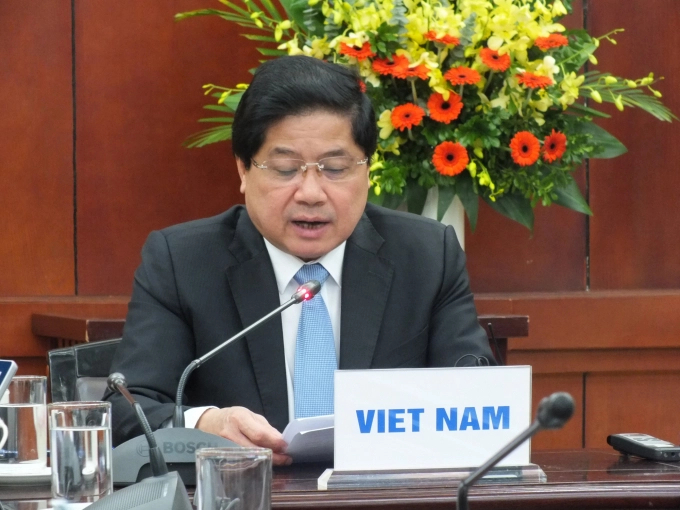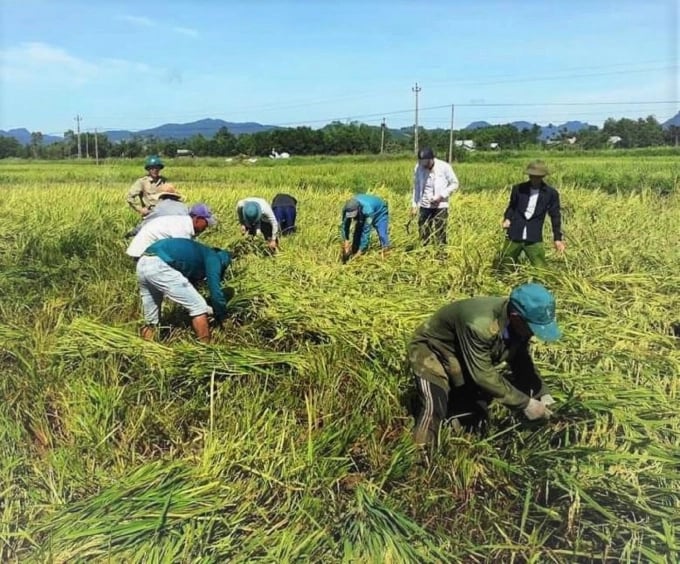May 30, 2025 | 23:16 GMT +7
May 30, 2025 | 23:16 GMT +7
Hotline: 0913.378.918
May 30, 2025 | 23:16 GMT +7
Hotline: 0913.378.918
At the conference, member countries of the APEC gave presentations on difficulties and challenges of the world economy and society in general and of APEC members in particular, especially those regarding food security and trade in agricultural products as a result of the Covid-19 pandemic.

Deputy Minister of Agriculture and Rural Development Le Quoc Doanh speaking at the conference with APEC members. Photo: Le Ben.
In addition, APEC member countries also introduced solutions and made commitments to continue supporting difficult countries to ensure food security as the Covid-19 continues to be complicated. They also offered solutions to ensure production and commited to create the most favorable conditions for agricultural trade between countries to maintain economic growth in general and agriculture sector in particular.
Speaking at the conference, Deputy Minister of Agriculture and Rural Development Le Quoc Doanh emphasized: As a major agricultural, forestry and fishery exporter in the region, Vietnam has made practical efforts to ensuring the continuity of the food supply chain, not letting international trade in food be disrupted by the Covid-19 pandemic.
Vietnam Government has promptly issued a number of necessary policies to step by step support businesses and people to overcome the difficulties of the Covid-19 pandemic, with the determination to realize the “dual goal”: both effectively preventing the pandemic and focusing on socio-economic recovery and development, as well as protecting people’s health.
In addition to ensuring food security for nearly 100 million people, in the first 9 months of 2020, Vietnam’s exported agricultural products reached over US$ 30 billion SD including 5 million tons of rice, reaching nearly US$ 2.45 billion (up 11.1% over the same period in 2019).

Vietnam ensures good food security in the context of severe natural disasters and the Covid-19 pandemic. Photo: TL.
Deputy Minister Le Quoc Doanh agreed with the Draft Ministerial Statement and stressed that APEC needs to soon take measures to ensure access to financial, technology and raw materials for agricultural, forestry and fishery production; ensure logistics activities, regional and international connection, and transport of food, agricultural and forestry products.
Accordingly, it is necessary to tighten the cooperation within APEC to strengthen the connection of supply chains of food, agriculture, forestry and fisheries; assist small farming households and SMEs to overcome the negative impacts of Covid-19; introduce credit packages with preferential interest rates from regional and international banks, and funds for households and SMEs.
At the conference, Mr. Ken Isley, Head of the Foreign Agricultural Service (US Department of Agriculture) said: Before the health crisis caused by the Covid-19 pandemic in the Asia-Pacific region, the United States had already had a range of policies on agriculture to cope with it.
The US government will continue to ensure large funding for scientific research to join international effort in combating the Covid-19 pandemic. It has announced spending more than $1.6 billion on emergency relief and implementation of humanitarian programs. In addition, it has also joined the global trading community to combat all forms of unfair food trade.
The US Government just celebrated the tenth anniversary of the Feed the Future Program in September 2020. This program is a collaborative US approach to food security. Ten years ago, Feed the Future was born after the global food crisis. Up until now, it is estimated that Feed the Future has helped 23.4 million people out of poverty. So in the face of the crisis of the Covid-19 pandemic, the United States has a stronger foundation to ensure food security...
Author: Le Ben. Translated by Meagan Phan. Edited by Duc Huy.

(VAN) Vaccinating juvenile pangasius helps reduce disease, antibiotic use, and farming costs, increasing profits for export-oriented farmers in An Giang.

(VAN) Due to a limited supply of workforce and competitive recruitment requirements, businesses struggle to retain talented veterinary human resources.

(VAN) WOAH’s guidance aims to mitigate disease risks through a One Health approach that balances economic, conservation, and public health interests.

(VAN) Ms. Nguyen Thi Dung, Deputy Director of Ngoc Hoang Cooperative, shared about the journey of bringing dragon fruit to Europe, achieving annual revenues in the billions of VND.

(VAN) Bamboo products from Thang Tho Bamboo Cooperative have reached many countries around the world, while also creating jobs for local workers.

(VAN) The Management Board of Con Dao National Park reported that a green sea turtle, tagged in the Philippines, has traveled thousands of kilometers to lay 84 eggs on Bay Canh Islet.

(VAN) Green technology is paving a new path for sustainable aquaculture in the Mekong Delta in particular and across the country in general, helping reduce emissions and adapt to climate change.